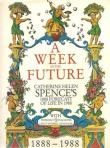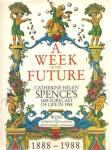AustLit
Latest Issues
AbstractHistoryArchive Description
'Emily Bethal is dying. The doctors give her two years at best. It will be two years of increasing pain and dependence. It is probably the dependence that Emily fears the most. She is independent, spirited and wilful. She has strong opinions and she knows the way the world works ... but she also knows how it should work. Is the deal worth it? Yes, she will avoid the two years of suffering and has traded it for for one week of living in the future. And the future she will see? The bright shiny wonderful and miraculous world of 1988. Yes 100 years into her own future takes her back to our recent past. See the wonders that Emily sees as she experiences a world that she just knows must exist for the betterment of all man ... and womankind.'
Source: 2010 Chimaera edition
Contents
-
A Week in the Future: Prologue,
single work
criticism
(p. 7-17)Ljungdahl explores the extent to which this novel of ideas draws on Clapperton's Scientific Melioration. She highlights the social changes outlined in A Week in the Future, but notes that the optimistic solutions Spence finds for society's problems are only superficially dealt with.
Publication Details of Only Known VersionEarliest 2 Known Versions of
Works about this Work
-
A Feminist, Imperialist Utopia: Sir Julius Vogel and Anno Domini 2000
2022
single work
essay
— Appears in: Meanjin , June vol. 81 no. 2 2022; (p. 176-182) Meanjin Online 2022; 'Utopias are neither as popular nor as frequent as their dark mirror, dystopias. Projecting from today into the future, using the thought experiment of extrapolation '(if this goes on...)' tends to produce more pessimism than optimism. That is hardly surprising in our perennially anxious times. Nor are vintage utopias palatable to a modern audience: they can contain racism, eugenics, or happily exterminate most of the biosphere (as in Joseph Fraser's 1889 'Melbourne and Mars: My Mysterious Life on Two Planets'). What can seem perfection then can read like tedious hell now. Additionally, utopias are not easy to write well, as polemical perfection lacks conflict, tension, the inherent interest of the devil's party. Some have endured, like Plato's Republic, but it is certainly less read than 'The Handmaid's Tale' or 1984.' (Publication abstract) -
Utopia and Utopian Studies in Australia
2016
single work
criticism
— Appears in: Utopian Studies , vol. 27 no. 2 2016; (p. 200-209) 'There are no independently Australian translations of Thomas More’s Utopia. Nor is there any equivalent in Australia to the Society for Utopian Studies in North America or the Utopian Studies Society in Europe. Nor are there any extant formal research groups or undergraduate or graduate courses in utopian studies. There are, however, distinctively Australian traditions of utopian writing, both eutopian and dystopian, and also a limited field of Australian utopian studies, essentially the work of individual scholars. This article attempts a brief description of both.' (Publication summary) -
Untitled
2011
single work
correspondence
— Appears in: The Weekend Australian , 5-6 February 2011; (p. 3) Magarey diputes George Williams's account of the inspiration and sources for Spence's novel. -
The Speculative Ghost of Futures Past
2011
single work
review
— Appears in: The Weekend Australian , 22-23 January 2011; (p. 20-21)
— Review of A Week in the Future 1889 single work novel ; Classic Australian SF 2010 series - publisher novel -
Alas, Life is so Unreasonable
1988
single work
review
— Appears in: The Sydney Morning Herald , 20 February 1988; (p. 73)
— Review of A Week in the Future 1889 single work novel
-
The Speculative Ghost of Futures Past
2011
single work
review
— Appears in: The Weekend Australian , 22-23 January 2011; (p. 20-21)
— Review of A Week in the Future 1889 single work novel ; Classic Australian SF 2010 series - publisher novel -
Alas, Life is so Unreasonable
1988
single work
review
— Appears in: The Sydney Morning Herald , 20 February 1988; (p. 73)
— Review of A Week in the Future 1889 single work novel -
Notes on Miss C. H. Spence
1896
single work
criticism
— Appears in: The Sydney Mail , 20 June vol. 61 no. 1876 1896; (p. 1269) 'Miss Spence is the Australian Harriet Martineau and has the energy and love of work of her great prototype. She is the author of a socio-political novel "A Week in the Future"'. -
Untitled
2011
single work
correspondence
— Appears in: The Weekend Australian , 5-6 February 2011; (p. 3) Magarey diputes George Williams's account of the inspiration and sources for Spence's novel. -
A Week in the Future: Prologue
1987
single work
criticism
— Appears in: A Week in the Future 1987; (p. 7-17) Ljungdahl explores the extent to which this novel of ideas draws on Clapperton's Scientific Melioration. She highlights the social changes outlined in A Week in the Future, but notes that the optimistic solutions Spence finds for society's problems are only superficially dealt with. -
Catherine Helen Spence, Unitarian Utopian
1971
single work
criticism
— Appears in: Australian Literary Studies , May vol. 5 no. 1 1971; (p. 31-41) Walker examines the religious foundation of Spence's political and social ideas in the context of the colonial and British background. Spence's conversion to the Unitarian church enabled her to reject the idea of predestination taught by the Presbyterian church and believe that anyone can change and be saved. Spence's subsequent belief in a utopian society is reflected in much of her writing, providing a view quite different to the more well-known writers of the Bulletin school. -
Catherine Helen Spence: Pragmatic Utopian
1983
single work
criticism
— Appears in: Who Is She? 1983; (p. 12-25) The author argues that the ideas Spence worked hard to disseminate were chiefly pragmatic; that she failed to understand the function of art and literature beyond the simply didactic. However, in her work, national pride found a definitive female voice for the first time.
-
cEngland,ccUnited Kingdom (UK),cWestern Europe, Europe,
- 1988








